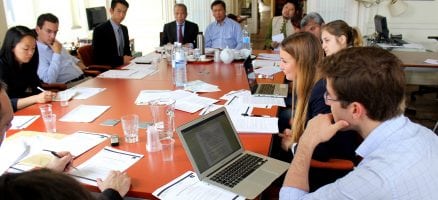On 17 June at 14:00 pm the UNPO, in collaboration with the South Asia Democratic Forum (SADF) and No Peace Without Justice (NPWJ), organised a roundtable discussion on the Chittagong Hill Tracts (CHT) Peace Accord, signed in 1997 by the Government on Bangladesh and the PCJSS, discussing the reasons behind the lack of implementation of some of its provisions as well as possible ways forward. The event was hosted in the Brussels office of NPWJ. Among others, council of Bangladesh Embassy in Brussels, representatives of SADF, NPWJ and UNPO, human rights activists attended the roundtable.
After welcome remarks by Mr Gianluca Eramo (NPWJ) and an introduction by UNPO, Mangal Kumar Chakma of PCJSS briefly introduced the CHT Accord and gave an overview of the current situation in the area, stressing once again the importance of giving power to the CHT Regional Council and Hill District Councils, as foreseen in the Accord. Ms Laura Berlingozzi (SADF) also gave her organisation’s perspective, stressing the importance to put pressure on the government to fully implement the accord and highlighting some of the most important issues facing the community.
Particiapting the discussion, Ushatan Talukder MP and Vice President of PCJSS said that the Government of Bangladesh (GoB) implemented some provisions of the Accord, but no effective initiative for implementation of the unimplemented provisions of the Accord has been taken even after 18 years. The government of Bangladesh, from its side, keeps on explaining that the majority portions of the Accord (48 provisions out of 72 provisions) have been implemented. PCJSS including CHT residents and civil societies, on the other hand, believe that only one-third provisions of the Accord (25 provisions out of the 72) have been implemented. In order to find a way out of this situation, Mr. Jyotirindra Bodhipriya Larma, one of the signatories to the CHT Accord and Chairman of CHT Regional Council, submitted a detailed report on “Accounts of Unimplemented Aspects of the CHT Accord” with 16 annexure to the Prime Minister of GoB Sheikh Hasina on 1 April 2015. Mr. Larma also had another meeting with Prime Minister on 6 August 2015. However, there has not been, following that report, any decision or directive regarding implementation of the Accord, which is a matter of concern and disappointment.
Pallab Chakma said that Bangladesh is committed to leading by example in the case of Sustainable Development Goals (SDGs) adopted by the UN General Assembly in September 2015 as it did in the case of the MDGs. Bangladesh looks at Agenda-2030 with much interest and wants to sustain the momentum of the MDGs, build on their successes, and transform Bangladesh, for the better. Indigenous peoples share this dream of other Bangladeshis.
A lively discussion followed, addressing the need to raise awareness about the case at the European level. The representative of the Embassy of Bangladesh also exposed the Government’s view, highlighting the progress made and reiterating the Prime Minister’s commitment to fully implement the Accord. Civil society representatives expressed their respective organisations’ interest in supporting the CHT delegation and creating a network on themes such as environmental protection, development, migration and human rights.


